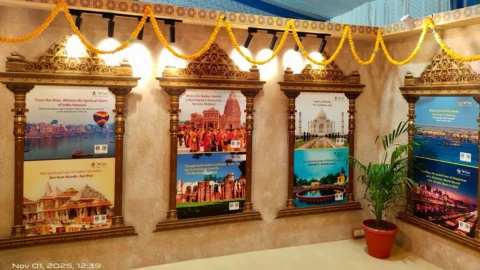In most parts of the world, museums are more than just tourist attractions; they are vibrant classrooms, memory banks, and cultural symbols. However, in Nigeria, museum visits have never really been a strong part of the country’s social culture.
For many families, school excursions to the museum are often the only encounter with these treasure troves of history. This lack of a ‘museum culture’ has meant that generations of Nigerians are cut off from regularly engaging with the very heritage that defines them.
But that reality will change soon. In a landmark move that blends heritage with innovation, IHS Nigeria and the National Commission for Museums and Monuments (NCMM) recently unveiled Nigeria’s first digital museum of antiquities, marking a transformative step in making the nation’s cultural legacy not only preserved but also more accessible than ever before.
During the coronavirus disease 2019 (COVID-19) pandemic, museums, as public gathering places for citizens, encountered unprecedented difficulties owing to limitations to operate as usual for their traditional exhibitions and curations.
According to Chukwuemeka Nnadozie, a visitor to museums, the digisation will help the facility to maintain a connection with their audiences.
Nnadozie said during COVID 19, many museums had an online and social media presence that kept them active, which the Nigeria museum lacked. His words: Most of them actively expanded their digital offerings, introducing new formats such as podcasts, digital guided visits, and online mediation.”
These initiatives were aimed at bridging the physical distance and enabling museums to stay in touch with the public.” The collaboration between IHS Nigeria — part of the world’s largest independent telecom tower company— and Nigeria’s museum commission might seem unusual. But it reflects a growing trend of businesses taking responsibility for social impact beyond their core operations.
Launched on August 14, 2025, in Lagos, the digital museum is the flagship project under NCMM’s Digital Culture Initiative, aligning with President Bola Ahmed Tinubu’s Renewed Hope Agenda. The initiative digitises Nigeria’s heritage, giving audiences the chance to explore it from their laptops or smartphones.
Unveiled by the Director General of the National Commission for Museums and Monuments, Olugbile Holloway, this landmark initiative represents a significant milestone in modernising the preservation and promotion of Nigeria’s cultural assets and making them more accessible to a global audience.
Nigeria’s Minister of Art, Culture, Tourism and the Creative Economy,
Hannatu Musawa, commented, “this historic event marks a transformative milestone in the preservation, promotion, and accessibility of Nigeria’s vast cultural heritage. For the first time, authentic Nigerian antiquities will be showcased in an innovative digital space, making our rich history and artistic expression accessible to audiences both within and beyond our borders. This initiative not only preserves our heritage, but also projects Nigeria’s cultural legacy onto the global stage.
Musawa, noted, the initiative is a “transformative milestone” in Nigeria’s cultural journey.
“This achievement sets a new benchmark for public-private partnerships in cultural advancement. For the first time, authentic Nigerian antiquities will be showcased in an innovative digital space, making our rich history accessible to audiences both within and beyond our borders,” she said.
“Today is a proud moment for us as we see the digital museum come alive,” says Mohamad Darwish, CEO of IHS Nigeria. “As a company deeply rooted in Nigeria, we are excited to have played a key part in this groundbreaking effort to preserve and promote Nigeria’s cultural heritage.”
The Darwish expressed pride in the collaboration: “This partnership reinforces our commitment to using technology to transform communities and drive economic growth”
By digitising Nigeria’s cultural legacy, the two firms are not only sparking a renewed interest in history among young Nigerians but also helping to instill pride, identity, and belonging. The digital museum is more than a website – it is a cultural bridge, a classroom, and a reminder that preserving the past is the best way to shape the future.
For the chief executive, this project is more than a technological milestone; it is a strategic expression of the company’s CSR philosophy. As part of IHS Towers, one of the world’s largest independent owners of shared communications infrastructure, IHS Nigeria has consistently aligned its operations with the United Nations Sustainable Development Goals (UN SDGs). Its CSR framework is built on four pillars: Education and Economic Growth, Environment and Climate Change, Ethics and Governance, and People and Communities.
Holloway said, “the launch of this digital museum represents a groundbreaking idea finally brought to fruition. The vision behind this museum is to make Nigeria’s heritage more accessible to a wider, younger, tech savvy audience. It is our hope that this first iteration of the digital museum will serve as a starting point for building a digital repository of real-life Nigerian antiquities that we will continue to expand over time.”
Already, more than 200 artefacts from the National Museum, Lagos, including Benin bronzes, Nok terracotta, ancient Ife sculptures, and relics from early Nigerian civilisations, have been 3D-scanned into an immersive online space. Each object is accompanied by historical notes and educational materials, creating a virtual tour that brings history to life.
Each object is also tagged with the relevant educational material to provide viewers with more information on the object being displayed. Importantly, the digital museum is not limited to the National Museum, Lagos. It provides access to collections from major museums across the country. This nationwide scope ensures that Nigeria’s diverse cultural expressions, from the Sahel to the coast are represented and celebrated.
For many Nigerians, this means the barriers of distance, cost, or even lack of awareness no longer stands in the way of cultural exploration. With just a click, students in Maiduguri can walk through the same halls as tourists in Lagos.
Art lovers in London or New York can now admire Nigeria’s priceless artefacts without leaving their living rooms. Perhaps most importantly, the digital museum offers access to collections not only in Lagos but also from museums across the country, ensuring the rich diversity of Nigeria’s culture is fully represented.
Beyond accessibility, the project underscores the importance of preserving cultural heritage. In a world where antiquities are at risk of theft, deterioration, or even destruction, digitisation provides a safeguard for future generations.
In the midst of all these executions is IHS Nigeria, a subsidiary of IHS Towers one of the world’s largest independent owners and operators of shared communications infrastructure. IHS Nigeria played a pivotal role in bringing this vision to life. The company’s commitment to sustainability and digital education was evident in its support for the project.
The digital museum is free to access and available through the NCMM’s website at www.museum.ng, inviting both Nigerians and the global community to explore the country’s artistic and historical treasures.
The platform offers a curated journey through Nigeria’s artistic and historical legacy. Visitors can explore Terracotta sculptures from Nok culture, dating back to 500 BC, showcasing early African artistry, Benin bronzes, renowned for their intricate craftsmanship and historical significance, Igbo-Ukwu artefacts, which reveal advanced metallurgy and trade networks from the 9th century amongst others. Each artefact is presented in high-resolution 3D, allowing users to rotate, zoom, and interact with the objects as if they were physically present.
Accompanying texts, audio guides, and video documentaries provide context, making the experience both educational and engaging. As Nigeria steps into a new era of cultural engagement, one thing is clear: our past has found a new home in the digital space, and it is here to stay.





